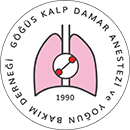

Risk Factors for Pressure Ulcers in the Intensive Care Unit in the Cardiac Center
Bedih Balkan1, Gülferen Turan Gevrek1, Zahide Özlem Ulubay2, Mustafa Can Kaplan3, Ali Osman Balkan41Department of Anesthesiology and Reanimation, Intensive Care Unit, Mehmet Akif Ersoy Thoracic and Cardiovascular Surgery Training and Research Hospital, İstanbul, Türkiye2Department of Anesthesiology and Reanimation, Mehmet Akif Ersoy Thoracic and Cardiovascular Surgery Training and Research Hospital, İstanbul, Türkiye
3Department of Cardiovascular Surgery, Mehmet Akif Ersoy Thoracic and Cardiovascular Surgery Training and Research Hospital, İstanbul, Türkiye
4Bezmialem Vakif University Faculty of Medicine, İstanbul, Türkiye
Objectives: Pressure ulcers (PUs) can negatively affect quality of life, prolong hospital stays, and increase the costs of health care. In this study, we evaluate the risk factors for the development of PUs in patients admitted to the cardiac intensive care units (ICUs) in our hospital.
Methods: We studied 229 patients who developed PUs in the ICUs between January 1, 2020, and August 30, 2021. We obtained patient data retrospectively from physician and nurse follow-up records. We recorded patient demographic and clinical characteristics, scores from Braden Scale for Predicting Pressure Sore Risk and from the Glasgow Coma Scale (GCS), percentage of ejection fraction (EF), body mass index (BMI), operation type, indication for hospitalization, and laboratory examinations during the stages of PU formation and on which day they occurred during ICU follow-up.
Results: Patient BMI, age, and gender did not significantly differ between the groups with and without PUs (p>0.05). However, the percentage of EF and GCS values were significantly lower (p<0.05), whereas glucose, urea, creatinine, C-reactive protein (CRP) values, and mortality rate were significantly higher (p<0.05) in the PU group.
Conclusion: We found that the rates of PU formation and transition from Stage I to Stage II significantly increased in patients with low EF and high CRP, urea, creatinine, and glucose levels.
Keywords: Cardiac center, ejection fraction, pressure ulcers
Makale Dili: İngilizce
(1292 kere indirildi)

















